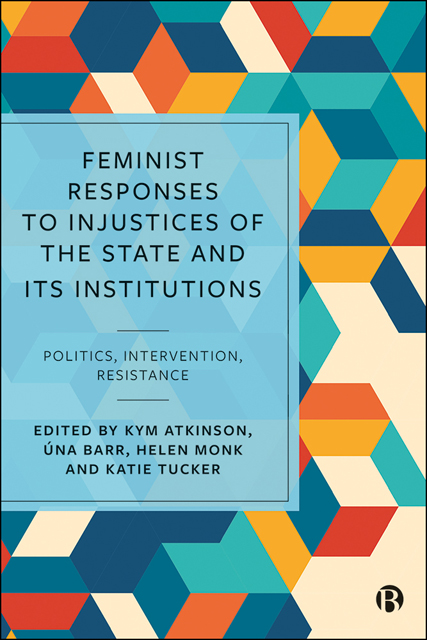 Feminist Responses to Injustices of the State and Its Institutions
Feminist Responses to Injustices of the State and Its Institutions 5 - Universities, Sexual Violence and the Institutional Operation of Power
Published online by Cambridge University Press: 17 June 2023
Summary
Introduction
The extent of sexual violence experienced by women university students has, in recent years, garnered increased media, political, academic and institutional attention, in the UK and internationally. In England and Wales, the National Union of Students’ (NUS) (2010) report, Hidden Marks, found that one in seven women students had experienced a serious or physical sexual assault and 68 per cent had experienced some form of verbal or nonverbal harassment, in and around their institution. The study highlighted the extent of sexual violence experienced by women university students, as well as a range of issues in relation to students’ limited awareness of institutional support and low levels of reporting and accessing support. While research and activism around the issue pre-dates the publication of Hidden Marks, it can be viewed as a turning point and a catalyst due to the range of media, political, institutional, academic and activist responses which followed (for an overview of these developments see Phipps and Smith, 2012; Lewis and Marine, 2018, 2019; Towl and Walker, 2019; Marine and Lewis, 2020).
Despite this increased focus on the issue, much has remained the same and further issues have been documented. The Office for National Statistics (ONS) (2017) found that students (6.4 per cent) were more likely to have been victims of sexual assault in the previous year than adults in other occupations. Testimonies online (Strategic Misogyny, 2017), and social media accounts such as Do Better Academia, have confirmed the nature and extent of sexual violence on campus as well as the problematic nature of institutional responses. Moreover, media reports have highlighted a range of issues, including prevalence (Batty et al, 2017; Reynolds, 2018; Batty, 2019), the failure of universities to respond adequately to incidents, victims and survivors (Jokic, 2020; Lawthom, 2020; Page et al, 2020; Pittam, 2020; Hall, 2021), and staff sexual misconduct against students (Batty, 2018). Universities were also found to be using non-disclosure agreements (NDAs) in cases of sexual violence (Weale and Batty, 2016), while The Guardian found that £90 million was spent over two years on upholding NDAs, some of which related to allegations of bullying, discrimination and sexual misconduct (Murphy, 2019).
These issues have emerged in a context where, as Field (2018: 1) has argued, ‘higher education has been hijacked by an increasingly aggressive neo-liberal ideology’.
- Type
- Chapter
- Information
- Feminist Responses to Injustices of the State and Its InstitutionsPolitics, Intervention, Resistance, pp. 99 - 120Publisher: Bristol University PressPrint publication year: 2022


